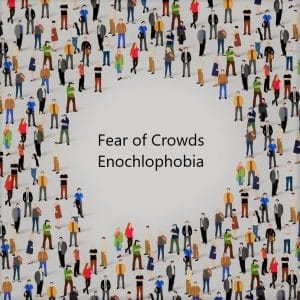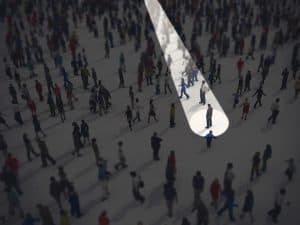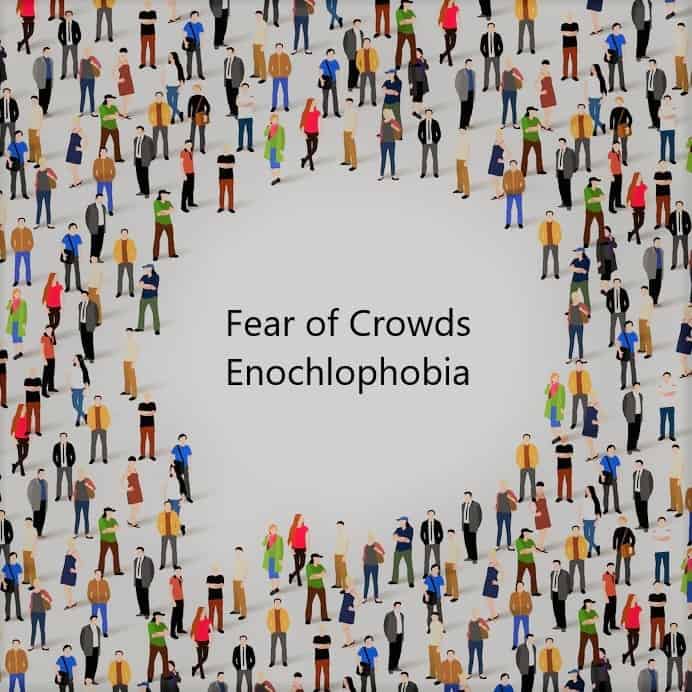Share This Article
The Fear of Crowds: It’s More Than You Think
It is remarkable how in the span of a few short months the sight of crowds has taken on a whole new meaning. Where crowded city streets used to be not just a way of life but, indeed, a sign of liveliness, in the midst of COVID-19, streets are empty and where crowds exist, so too does fear.
But what if your fear of crowds precedes COVID-19? What if the sight of crowds themselves are enough to make you want to quarantine yourself away from the world? What if you have a fear of crowds themselves? If so, you’re not alone, but you might be surprised as to what that fear actually means, or is called, and what it will take to overcome it.
A fear of big crowds is no small thing, so let’s take a closer look at the fear of crowds and see what’s behind it.

What’s in a Name?
First and foremost, it’s important to establish that a fear of crowds may not mean what you think it means. Many people tend to associate agoraphobia with a fear of crowds, and while there may be some overlap there as we’ll see, the technical term for a fear of crowds is enochlophobia.
The difference between the two may be seen in their names. “Ochlo” is the Greek word for “crowd,” while “agora” is the Greek word for “market.” As such, agoraphobia is actually the fear of feeling trapped, humiliated, or otherwise anxiety-ridden in open yet confined places, like marketplaces. There are likely to be crowds in places such as these, adding to and perhaps triggering your fear of being trapped or humiliated, but it isn’t the crowd yourself of which you are afraid. By contrast, enochlophobia is the fear of the crowds themselves.
This quibble over what a fear of crowds is called isn’t simply semantic or syntactic. Returning to our COVID-19 example, if what makes you fearful of large crowds is the prospect of catching the virus, you probably don’t have a fear of crowds phobia, at least not in its own right. On the other hand, if you would be afraid of crowds no matter what and have been since before this pandemic began, your chances of having something akin to enochlophobia are far greater.
Causes and Symptoms of Fear of Crowds
All of that is well and good, but what does that actually mean for those who suffer from a fear of big crowds in their own right?
For one thing, it is important to note that enochlophobia is not recognized as a standalone phobia in the DSM-5. Instead, it is considered to be a specific phobia, meaning that it is particular to the person who has it. Your enochlophobia, if you have it, is likely to be different and triggered by different crowd-related things than someone else’s. This can make it difficult to diagnose, since aside from that broad definition of fearing crowds, it is hard to generalize about those who have different forms of enochlophobia. Different things cause different forms of enochlophobia.
Some generalized causes for enochlophobia typically include forms of personal trauma. If you have had an exceptionally bad experience with crowds in the past, that may be the catalyst for the formation of a phobia such as enochlophobia. This trauma can take several forms. Maybe you were in a crowd when something bad happened, or maybe you watched or heard about something bad happening in a crowd to someone you cared about, or maybe you had overprotective parents who instilled a fear of large crowds in you from the beginning.
Again, these tend to vary from person to person, nailing down specific causes which can apply to most or all cases is very difficult.

Common symptoms of enochlophobia that most sufferers tend to experience in some form or another include:
- Trembling
- Elevated heart rate
- Nausea and vomiting
- Heart palpitations
- Feeling like you’re being suffocated
- Stomach pain
- Dizziness and headaches
- Blacking out
- Dilated pupils
- A sense of depersonalization or desperation
- Bursting into tears
- Clinging onto someone
- A sudden urge to escape
- An extreme fear of public humiliation
Who Suffers from Enochlophobia?
According to online polls , near 90 percent of those responding who say they had enochlophobia were 35 or younger, while over 63 percent were women. There may be a correlation from factors such as rape culture making women feel less safe in public spaces, or that men tend to have more of a pack mentality.
Conditions Related to Enochlophobia
The symptoms listed above do have a lot of overlap with agoraphobia, and again, the two are often related if still separate conditions.
There are several conditions related to enochlophobia that may impact your experience with it, including:
- Ochlophobia, which is the fear of mobs
- Demophobia, which is the fear of uncontrolled masses of people
- Agoraphobia which, as mentioned, is tied to public places, but can be triggered in part by crowds of people therein
- Social Anxiety Disorder, which refers to generalized fears of being humiliated in front of people, which can naturally be exacerbated by large crowds of people
The first two are essentially even more highly specific versions of a fear of crowds, while the latter two touch on different types of phobias that may have considerable overlap with enochlophobia.
Self-Treatment Options for Enochlophobia
As a highly particularized phobia, a fear of crowds is something for which you may be asked to undergo self-treatment. In some situations, you are the best person to help yourself, and this is one of them.
There are a wide range of effective self-treatment options for enochlophobia:
- Meditation: This is a common technique for tackling varied personal phobias. Deep breathing exercises and practice controlling your nerves can help calm you, preparing you for dealing with the hustle and bustle of crowds.
- Taking the plunge: Sometimes the best way to tackle your fears is to face them head on. By directly exposing yourself to crowds, you can help assuage your fear of it. That said, you should only do this in a safe, controlled manner. Make sure you have someone you trust on hand as a support system, and make sure that you are walking in an area with a relatively good safety record. The last thing your enochlophobia needs is another bad experience to deepen your fears.
- Talking to others: As alluded to above, you are far from alone in your fear of crowds. Speaking with others who share your fears can help you all overcome them by acting as a mutual support system for one another. You may even discover some great new friends along the way.
- Journaling: Sometimes the best way to deal with phobias is to get them out, and writing is one of the best ways of doing just that.
Professional Treatment Options for the Fear of Crowds
If these treatments aren’t helping or you feel you need further guidance, see a mental health professional. They can prescribe a wide range of treatments, from cognitive behavioral therapy (CBT), which works to rewire how your brain associates certain ideas (in this case crowds), to exposure therapy, discussions and possibly even medications, though the latter is far less common.
You are not merely a face in the crowd. Your fears, phobias, and feelings matter, and with the right approach, you can conquer your enochlophobia.



